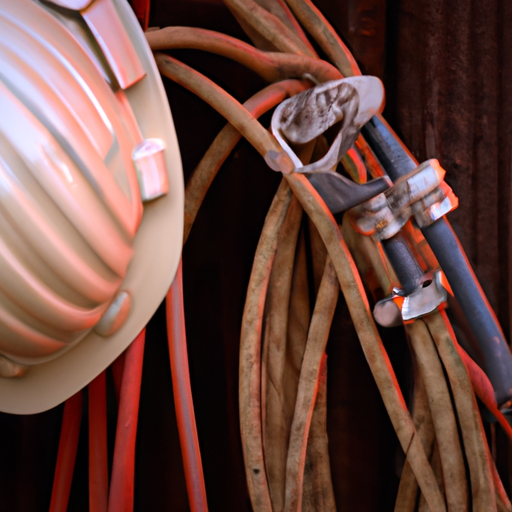In this article, you will learn about the basic requirements needed to qualify for a lineman job. Whether you’re interested in working on power lines or telephone lines, understanding these requirements will help you start your career in the field. So, if you’re curious about what it takes to become a lineman, keep reading!
To qualify for a lineman job, there are a few essential requirements you need to meet. Firstly, you will need a high school diploma or GED. This shows potential employers that you have a basic level of education and can effectively communicate and understand instructions.
Additionally, physical fitness is crucial for this role, as linemen often have to work at great heights and in challenging outdoor conditions. Having good physical stamina and strength will help you perform your duties safely and efficiently. Lastly, some employers may require you to have a valid driver’s license, as linemen often travel to different work sites and need to transport equipment.

Understanding the Lineman Job
Defining the role of a lineman
A lineman, also known as a powerline technician, is responsible for the installation, maintenance, and repair of electrical power systems. This includes working on overhead and underground power lines, as well as substations and other electrical equipment. Linemen play a crucial role in ensuring that electricity is transmitted safely and effectively to homes, businesses, and other establishments.
Importance and demand for lineman jobs
In today’s modern world, electricity is an essential part of our daily lives. It powers our homes, businesses, and industries, making it crucial to have skilled professionals to maintain and repair electrical power systems. Linemen are in high demand due to the growth of the electrical industry and the need for reliable power supply. The importance of linemen in maintaining and restoring power during outages or emergencies cannot be overstated.
Benefits of pursuing a career as a lineman
Choosing a career as a lineman offers several benefits. Firstly, it provides a sense of fulfillment and purpose as linemen play a critical role in keeping the community connected and ensuring a reliable power supply. Secondly, lineman jobs often come with excellent pay and benefits. Additionally, linemen enjoy job security due to the high demand for their services. Furthermore, this career path offers opportunities for advancement and growth, allowing individuals to constantly improve their skills and take on higher-level responsibilities.
Basic Qualifications for a Lineman Job
Education and training requirements
To qualify for a lineman job, a certain level of education and training is required. While a high school diploma or equivalent is the minimum educational requirement, individuals with additional technical education or training are often preferred. Many technical schools and vocational institutions offer specialized lineman training programs that provide the necessary knowledge and skills for the job.
Physical fitness and strength
Working as a lineman can be physically demanding. In addition to having the necessary technical skills, linemen need to be physically fit and strong. The job often involves climbing poles, lifting heavy equipment, and working in various weather conditions. Therefore, applicants must meet certain physical fitness standards to demonstrate their ability to handle the physical demands of the job.
Technical skills and knowledge
Linemen need to have a solid understanding of electrical systems, components, and safety protocols. They should be knowledgeable about different types of power lines, transformers, circuit breakers, and other equipment used in the electrical industry. Technical skills, such as the ability to operate lineman tools and equipment, are also essential. Linemen must be trained in proper safety procedures to minimize the risk of accidents and ensure the well-being of themselves and their fellow workers.
Educational Requirements for a Lineman Job
High school diploma or equivalent
While a high school diploma or equivalent is the minimum educational requirement for a lineman job, it is beneficial to have a strong foundation in math, science, and technical subjects. These subjects provide a solid basis for understanding the principles of electricity and electrical systems, which linemen work with on a daily basis.
Vocational or technical training programs
Many technical schools and vocational institutions offer specialized lineman training programs. These programs typically provide a combination of classroom instruction and hands-on training, allowing students to gain practical skills and knowledge. The duration of these programs can vary, but they generally range from several months to a year.
Apprenticeship opportunities and certifications
Apprenticeship programs are an excellent way to gain practical experience and further develop skills in the field. These programs typically combine on-the-job training with classroom instruction, allowing apprentices to work alongside experienced linemen and learn from their expertise. Upon completing an apprenticeship program, individuals can obtain certifications such as Journeyman Lineman or Apprentice Lineman, which are recognized credentials in the industry.

Physical Fitness Criteria
Health and fitness standards for lineman jobs
To qualify for a lineman job, individuals must meet specific health and fitness standards. These standards may vary depending on the employer and the job requirements. Linemen often need to undergo medical examinations to ensure that they are physically capable of performing the tasks of the job safely and effectively.
Physical agility and endurance requirements
Working as a lineman requires physical agility and endurance. Linemen must be able to climb poles, maneuver equipment, and work at heights for extended periods. They may also need to perform physically demanding tasks in challenging weather conditions. It is important for linemen to maintain their physical fitness and stamina to meet the demands of the job.
Safety precautions and risk management
Safety is of utmost importance in the lineman profession. Linemen must adhere to strict safety protocols and guidelines to minimize the risk of accidents and injuries. This includes wearing appropriate protective gear, using safety equipment, and following established procedures. Physical fitness plays a significant role in ensuring the safety of linemen and their colleagues while working in potentially hazardous conditions.
Technical Skills and Knowledge
Understanding electrical systems and components
Linemen must possess a solid understanding of electrical systems and components. This includes knowledge of electrical theory, circuitry, and the operation of various equipment used in power distribution. They need to be familiar with power lines, transformers, switchgear, insulators, and other components essential to the electrical grid.
Knowledge of safety protocols and regulations
Alongside technical knowledge, linemen must be well-versed in safety protocols and regulations. They need to be aware of industry standards and best practices to ensure their own safety and the safety of others. Linemen must understand the potential hazards of the job and practice proper safety procedures to prevent accidents and minimize risks.
Proficiency in operating lineman tools and equipment
Linemen use a variety of tools and equipment in their work. These may include power drills, wire cutters, volt meters, bucket trucks, and climbing gear, among others. To qualify for a lineman job, individuals must have the ability to operate these tools and equipment effectively and safely. Proficiency in using these tools is crucial for both efficiency and safety on the job.
Gaining Experience in the Field
Internships and entry-level positions
For individuals starting their careers in the lineman industry, internships and entry-level positions provide valuable opportunities to gain hands-on experience. These positions allow individuals to learn from experienced professionals and acquire practical skills in a real-world setting. Internships and entry-level positions often serve as stepping stones towards more advanced roles in the field.
On-the-job training and mentorship programs
Once employed as a lineman, individuals can continue to gain experience through on-the-job training and mentorship programs. Working alongside experienced linemen provides an invaluable learning experience, allowing individuals to further develop their skills and knowledge. By observing and learning from experienced professionals, linemen can enhance their expertise and progress within the field.
Progressing through different levels of experience
As linemen gain experience and demonstrate competence in their work, they can progress through different levels in their careers. For example, individuals may start as apprentice linemen and, through training and experience, work their way up to becoming journeyman linemen or even supervisors or managers. Progressing through different levels allows linemen to take on more responsibility and tackle more challenging projects.
Building a Strong Resume
Showcasing relevant qualifications and certifications
When applying for a lineman job, it is important to showcase relevant qualifications and certifications in the resume. This includes highlighting any vocational training, apprentice programs, or technical certifications that are relevant to the lineman profession. By demonstrating the possession of these qualifications, applicants can stand out and show their commitment to the field.
Highlighting practical experience and accomplishments
Practical experience is highly valued in the lineman industry. When crafting a resume, it is crucial to highlight any relevant work experience and accomplishments in the field. This can include details about specific projects, tasks, or responsibilities that demonstrate the applicant’s ability to perform the duties of a lineman effectively.
Emphasizing safety record and adherence to protocols
Safety is a top priority in the lineman profession. Employers look for candidates who prioritize safety and adhere to established protocols. When writing a resume, applicants should emphasize their commitment to safety, their adherence to safety guidelines, and any specific safety training they have undergone. This highlights their dedication to workplace safety, which is highly valued by employers.
Preparing for the Lineman Interview
Researching the company and job requirements
Before attending a lineman interview, it is important to research the company and understand the specific job requirements. This allows applicants to tailor their answers to the company’s needs and demonstrate their knowledge of the industry. Employers appreciate candidates who show genuine interest in the company and have taken the time to familiarize themselves with its operations.
Preparing answers for common lineman interview questions
Lineman interviews often include questions to assess an applicant’s technical knowledge, problem-solving skills, and ability to work as part of a team. It is beneficial to anticipate and prepare answers for common lineman interview questions. This includes questions about technical skills, experience with specific equipment, and the ability to handle challenging situations.
Demonstrating enthusiasm and dedication
During the lineman interview, it is important to demonstrate enthusiasm and dedication to the job. Employers look for individuals who are passionate about their work and show a genuine interest in the lineman profession. By showcasing enthusiasm, applicants can leave a positive impression and increase their chances of securing the job.
Networking and Industry Connections
Joining professional associations and organizations
Networking is a valuable tool for career advancement in the lineman industry. Joining professional associations and organizations provides opportunities to connect with experienced linemen, industry experts, and potential employers. These associations often offer resources, networking events, and educational opportunities that can enhance one’s professional development.
Attending industry events and conferences
Attending industry events and conferences is another way to build connections and stay up to date with the latest developments in the lineman field. These events bring together professionals from various sectors of the electrical industry, providing opportunities for networking, learning, and sharing experiences. By actively participating in these events, individuals can expand their professional network and learn from industry leaders.
Networking with experienced lineman and industry experts
Establishing connections with experienced linemen and industry experts can be invaluable for career growth. Networking with these individuals allows for mentorship opportunities, as well as access to valuable advice and insights. Experienced linemen can provide guidance on career progression, offer tips for success, and serve as valuable references for future job opportunities.
Conclusion
In conclusion, pursuing a career as a lineman offers opportunities for personal growth, job security, and fulfillment. To qualify for a lineman job, meeting the basic qualifications is essential. This includes having the necessary education and training, maintaining physical fitness, possessing technical skills and knowledge, and gaining practical experience. Building a strong resume, preparing for interviews, and networking with industry professionals can further enhance one’s chances of securing a lineman job. By meeting the requirements and showcasing dedication to the profession, individuals can embark on a rewarding career as a lineman and contribute to the reliable and safe transmission of electricity.




